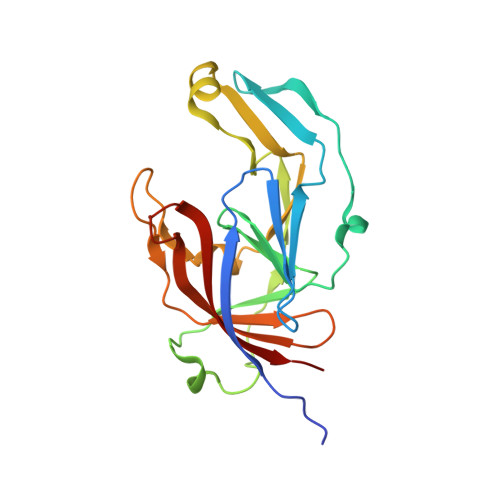Tannerella forsythiaTfo belongs toPorphyromonas gingivalisHmuY-like family of proteins but differs in heme-binding properties.
Bielecki, M., Antonyuk, S., Strange, R.W., Smalley, J.W., Mackiewicz, P., Smiga, M., Stepien, P., Olczak, M., Olczak, T.(2018) Biosci Rep 38
- PubMed: 30266745
- DOI: https://doi.org/10.1042/BSR20181325
- Primary Citation of Related Structures:
6EU8, 6EWM - PubMed Abstract:
Porphyromonas gingivalis is considered the principal etiologic agent and keystone pathogen of chronic periodontitis. As an auxotrophic bacterium, it must acquire heme to survive and multiply at the infection site. P. gingivalis HmuY is the first member of a novel family of hemophore-like proteins. Bacterial heme-binding proteins usually use histidine-methionine or histidine-tyrosine residues to ligate heme-iron, whereas P. gingivalis HmuY uses two histidine residues. We hypothesized that other 'red complex' members, i.e. Tannerella forsythia and Treponema denticola might utilize similar heme uptake mechanisms to the P. gingivalis HmuY. Comparative and phylogenetic analyses suggested differentiation of HmuY homologs and low conservation of heme-coordinating histidine residues present in HmuY. The homologs were subjected to duplication before divergence of Bacteroidetes lineages, which could facilitate evolution of functional diversification. We found that T. denticola does not code an HmuY homolog. T. forsythia protein, termed as Tfo, binds heme, but preferentially in the ferrous form, and sequesters heme from the albumin-heme complex under reducing conditions. In agreement with that, the 3D structure of Tfo differs from that of HmuY in the folding of heme-binding pocket, containing two methionine residues instead of two histidine residues coordinating heme in HmuY. Heme binding to apo-HmuY is accompanied by movement of the loop carrying the His 166 residue, closing the heme-binding pocket. Molecular dynamics simulations (MD) demonstrated that this conformational change also occurs in Tfo. In conclusion, our findings suggest that HmuY-like family might comprise proteins subjected during evolution to significant diversification, resulting in different heme-binding properties.
Organizational Affiliation:
Faculty of Biotechnology, University of Wrocław, Wrocław, Poland.















